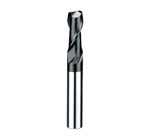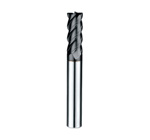Corner-Radius End Mills








Corner-radius end mills, also known as bull-nose end mills, are a hybrid cutting tool combining elements of both square end mills and ball end mills. Their primary characteristic—a rounded radius at the cutting edge—offers a practical solution to many machining challenges, particularly those involving strength, durability, and surface finish. This article explores the key features, performance advantages, material compatibility, and common industrial applications of corner-radius end mills.
1. Features of Corner-Radius End Mills
Corner-radius end mills are designed to enhance tool life and part quality through a simple but effective design adjustment: the sharp corner of a square end mill is replaced with a small radius.
- Corner Radius Geometry:
A small, rounded radius at the cutter's tip reduces stress concentration and minimizes the risk of chipping or fracture. - Flat Bottom Cutting Face:
Similar to square end mills, they can perform flat-bottom machining while offering better durability. - Multiple Flute Options:
Available with different flute counts (typically 2 to 6), which affect chip evacuation, finish quality, and feed rate. - Tool Coatings:
Frequently coated with high-performance materials such as Titanium Nitride(TiN), Titanium Aluminum Nitride (TiAlN), or Aluminum Chromium Nitride (AlCrN) for increased wear resistance and thermal protection. - Available in Various Sizes:
Offered in different lengths, diameters, and corner radii to suit various applications from roughing to finishing.
2. Corner-Radius End Mill Performance Characteristics
Corner-radius end mills are widely regarded for their ability to deliver both performance and durability in demanding machining environments.
- Extended Tool Life:
The rounded corners absorb and distribute cutting forces more effectively, reducing the likelihood of premature tool failure. - Improved Part Finish:
The small radius provides a smoother finish in internal corners and reduces burr formation compared to sharp-cornered tools. - Higher Feed and Speed Capability:
Enhanced edge strength allows for more aggressive cutting parameters, especially in high-speed machining operations. - Reduced Tool Deflection and Vibration:
The reinforced geometry adds rigidity, improving dimensional accuracy and surface consistency. - Versatile Usage:
Effective in both roughing and finishing, particularly for parts with filleted features or where corner integrity is crucial.
3. Corner-Radius End Mill Working Materials
Corner-radius end mills are suitable for machining a wide variety of materials, thanks to their robust design and advanced tool coatings.
Compatible Workpiece Materials
- Ferrous Metals:
Mild steel, stainless steel, hardened tool steels, cast iron. - Non-Ferrous Metals:
Aluminum, copper, brass, titanium, and other alloys. - Plastics and Polymers:
Especially useful when machining engineering plastics like PEEK or polycarbonate. - Composite Materials:
Carbon fiber and fiberglass composites, where edge strength and heat resistance are critical.
Tool Materials
- Solid Carbide (common for high-performance applications)
- High-Speed Steel (HSS) (suitable for general machining and lower speeds)
- Coated Carbide (for high-temperature, high-wear scenarios)
4. Corner-Radius End Mill Industrial Applications
Corner-radius end mills are used across a wide range of industries, particularly in applications where precision, durability, and high-speed machining are required.
Aerospace Industry- Machining aircraft components from titanium and aluminum alloys.
- Finishing critical structural parts with smoother corner transitions to reduce stress concentrations.
- Used in engine block manufacturing, transmission components, and dies for plastic molding.
- Ensures clean internal transitions and longer tool life when cutting hardened steel.
- Ideal for mold cavities, punches, and dies that require smooth transitions and tight tolerances.
- Machining stainless steel and titanium parts like implants, instruments, and housings.
- Achieves clean edges and finishes necessary for biomedical applications.
- Applicable in prototyping, precision part manufacturing, and custom fabrication requiring durable tools with good surface quality.
Corner-radius end mills represent a smart solution to common challenges in precision machining. By combining the flat cutting capability of square end mills with the enhanced durability of a radiused edge, they provide improved tool life, smoother finishes, and increased productivity. Whether in aerospace, automotive, or mold-making industries, these tools are essential for modern, high-precision manufacturing operations.
